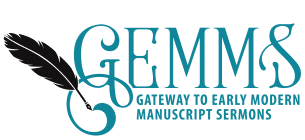Catherine Evans; David Robinson
ODNB (Article: 18009)
Baptized 31 March 1620 at Lydeard St Lawrence, Somerset, where his father, also named Thomas Manton, was likely curate. Matriculated from Wadham College, Oxford 11 March 1635/6. BA from Hart Hall 15 June 1639; BD from Wadham 1654, then created DD in 1660. Ordained deacon in 1640, but his Presbyterian views disinclined him to take ordination to the priesthood. He was then made lecturer at Sowton, near Exeter where he married Mary Morgan of Sidbury in May 1643. They fled in September that year when Royalist forces took control of Exeter. In July 1645 they fled to London where Manton was made rector of St Mary, Stoke Newington. Zealous in establishing Presbyterian church governance in his congregation there, and in London more broadly as an active member of London's eighth classis. He opposed the Republic, but had a successful career during the protectorate, being appointed a commissioner (or trier) for the approbation of public preachers in 1654, chaplain to Oliver Cromwell, lecturer at Westminster Abbey in 1656, and finally rector of St Paul, Covent Garden later that year. Supported the restoration of Charles II after the army deposed Richard Cromwell at met him at Breda. This connection initially allowed him to continue at St Paul after the restoration, despite his Presbyterianism. One of a number of Presbyterian clergy that presented reform proposals to the king at Lord Chancellor Manchester's residence in October 1660, proposals which ultimately led to the Savoy Conference. Compromise between Anglicans and Presbyterians was not reached and Manton and his fellow Presbyterians were ejected for nonconformity in 1662. Nevertheless, he continued to preach with the patronage of Presbyterian nobles but nevertheless was made chaplain and continued discussions with the king. He was licensed as a Presbyterian with the Declaration of Indulgence in 1672. This allowed him to lead a congregation at his home in Covent Garden and serve as a lecturer at the joint Presbyterian-Congregationalist congregation at Pinner's Hall, Old Broadstreet. However, his health steadily declined in late 1675 and he died 18 October 1677.
